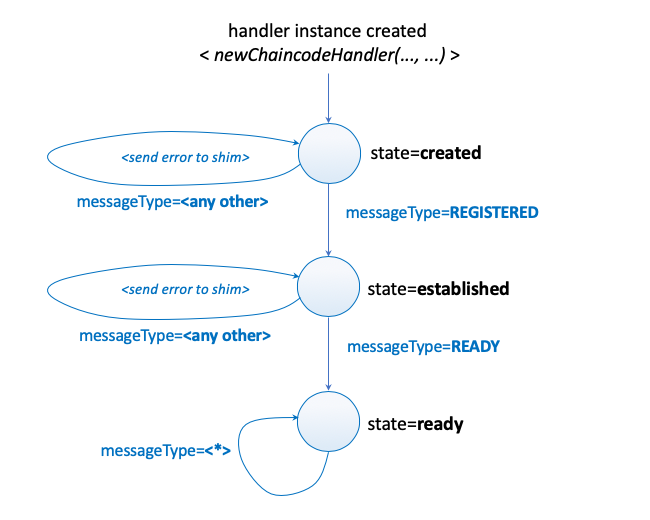Handler
The chaincode handler is responsible for managing the entire communication protocol with the peer (from the initialisation of the communication to the end) and ultimately for invoking the Chaincode interface methods on the configured implementation.
More specifically, the responsibilities of the handler are:
ChaincodeMessagepacking and unpacking;- concurrency management to support multiple transaction execution at the same time;
- chaincode implementation life-cycle management (register, initialise, and execute);
- recreation of the transaction context required to invoke smart contract methods; and
- request forwarding from the chaincode implementation to the peer (i.e. ledger queries and cross-chaincode invocations).
The handler is defined in the handler.go.
Execution Model
The handler exists a single instance in in the shim and it is implemented as a state machine that follows the life-cycle of the chaincode. The state evolution is shown in the figure below and it is driven by the messages received from the peer.

There are three states that define the behaviour of the handler: created, established, and ready. The state of the handler determines the type of messages that it expects from the peer for a correct interaction protocol.
Initialisation
A new instance of the handler is created by shim during setup, via the newChaincodeHandler(stream PeerChaincodeStream, cc Chaincode) method. This method configures the handler with the Chaincode implementation, the bidirectional stream, and also initialises the internal data structure required by the handler to operate.
The invocation of the method returns a pointer to the Handler struct that is shown in the listing below. Upon creation the handler is set to the created state.
type Handler struct {
// used to serialise the access to the stream
// and synchronise concurrent writes
serialLock sync.Mutex
// bidirectional stream open with the peer configured
// to exchange pb.ChaincodeMessage instances
chatStream PeerChaincodeStream
// chaincode implementation
cc Chaincode
// state of the handler
state state
// used to serialise updates to the responseChannels
// map that keep tracks of the chaincode requests to
// the peer that are currently in flight
responseChannelsMutex sync.Muttex
// keeps track of the chaincode requests to the peer
// currently in flight. For each transaction there is
// an expectation that at most one request at the time
// will be active
responseChannels map[string]chan pb.ChaincodeMessage
}
Functionalities
The Handler struct is bound to methods that cater for four distinct capabilities.
Sending and Receiving Messages
serialSend(msg *pb.ChaincodeMessage)serialSendAsync(msg *pb.ChaincodeMessage, errc <- chan error)sendReceive(msg *pb.ChaincodeMessage, responseChan <- chan pb.ChaincodeMessage)
Processing Messages from the Peer
handleXXX(msg *pb.ChaincodeMessage)handleStubInteraction(..., *pb.ChaincodeMessage)
Processing Request/Responses from the Stub
handleXXX(....)- in this case the argument is not apb.ChaincodeMessagecreateResponse(status int32, payload []byte)
Managing Response Channels
createResponseChannel(channelID string, txid string)deleteResponseChannel(channelID string, txid string)